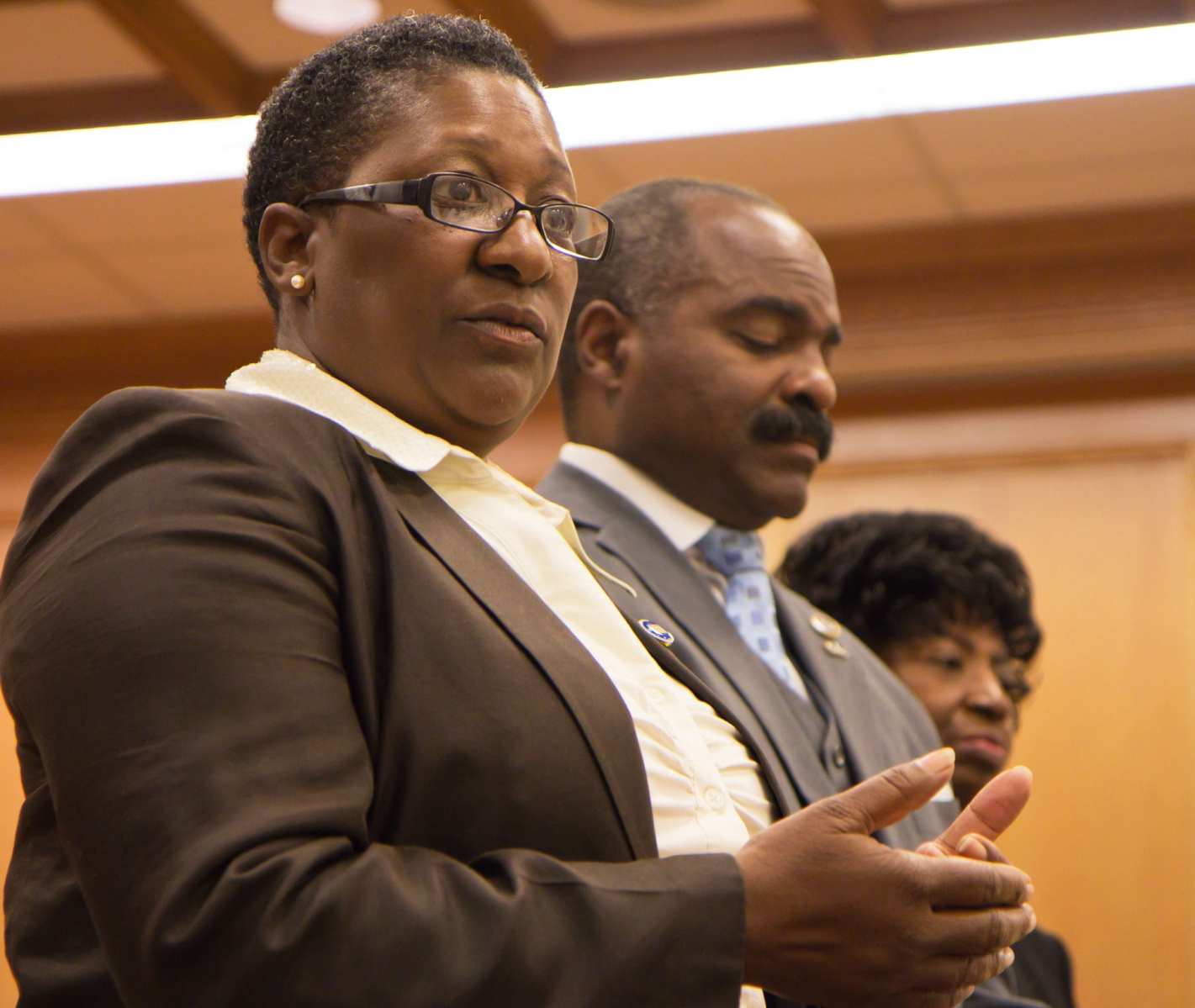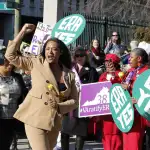Karen Camper’s favorite part about serving in the Tennessee Legislature is meeting the school children visiting the state Capitol, who she sometimes speaks with when field trips stop by the legislative chambers.
Camper, who is Black, notes the way that some young Black girls lock eyes with her in conversation.
“When they see Black women rising up and being put in these positions of trust, it does something for the change that they want to make,” she said. “It gives them hope.”
Camper, a Democrat, is the minority leader in the Tennessee House of Representatives — the first Black person to be elected to the position. She stands on the shoulders of people like Lois DeBerry, who in the 1980s was elected speaker pro tempore in the Tennessee House, the first woman and first African-American to hold that position. Several years later, Thelma Harper became the first Black woman elected to the Tennessee Senate. Harper announced her retirement in 2018, the same year Camper was elected House minority leader.
Camper feels a sense of responsibility — to the children who come to visit the statehouse, to women of power who came before her — to lead. And with 2020 marking 100 years since the passage of the 19th Amendment, that influence has been top of mind.
“It’s a lot of pressure to make sure that you represent women in a way that elevates the greatness of why it was important for us to have a vote,” Camper said.
Tennessee has a historic role in adding the 19th Amendment to the U.S. Constitution. On August 18, 1920, the all-male Tennessee Legislature became the 36th state to ratify the amendment that acknowledged women’s right to vote.
But Camper is quick to point out that the 19th Amendment ultimately granted White women the right to vote; Black women and other women of color would fight for several more decades to advance policies and laws that would give them access to the ballot box.
“There were Black women who were fighting,” Camper said, noting the contributions of suffragists like Sojourner Truth and Ida B. Wells. “But the word is just not out there about who they are and what they did.”
Camper is thinking about the unfinished business behind the anniversary. In her time as House minority leader, Camper has tried to advocate for legislation that she believes will help underrepresented communities, issues like helping people out of poverty and trying to expunge the records of ex-offenders.
“On one hand, it’s great the significant role that Tennessee had to play,” Camper said. “Now I’m in this position to say, there are still fights that have got to take place.”
Camper is one of just 75 women in statehouses around the country who serve in top legislative positions. There are about 2,145 women who serve in statehouses around the country, out of 7,383 state legislative seats.
“I think time brings about change,” Camper said. “If we look at the time we are in, women are ascending to these leadership positions. It’s not easy, it’s a fight … traditionally women have not been at the table to even just have a voice. So I’m grateful to be there to just have a voice.”
Camper is also president of the National Organization of Black Elected Legislative Women (NOBEL). The group, created in the 1980s, provides support to increase the number of Black women in elected office.
Krystal Leaphart, operations and policy associate for the organization, said representation of leaders like Camper matters.
“We’re seeing that enthusiasm across the country as more and more Black women are elected to higher office and are elected to Congress, even extending to the nomination for vice president,” Leaphart said. “That’s not an accident. More and more people are seeing how much trust folks have in Black women to lead, and we’ve been doing it since we arrived here … we are not an afterthought, and we’re only going up from here.”
But there are still massive gaps. There are 132 lawmakers in the Tennessee Legislature, and recent data by the National Conference of State Legislatures shows only 21, or 15.9 percent, are women. It’s a figure that has been stagnant for several years. In the House specifically, the number of women decreased from 16 in 2018 to 12 in 2020, a reality that Camper called “disheartening.”
Among both chambers, seven women identify as a person of color, according to data compiled by the Center for American Women and Politics at Rutgers University. The three Black people in the 33-member Tennessee Senate are Democratic women.
Camper wants more women to run for office, particularly for the statehouse. She believes it will require demystifying the place and its outsized impact.
“What I don’t think people get a full appreciation of is state politics. They get the governorship, but the House and the Senate at the state level … it’s a continuous education process,” she said. “And we’re the ones passing laws that affect their daily lives, for real. And people still don’t have a full understanding of state-level politics.”
London Lamar thinks a lot about the right to vote. The Tennessee state representative grew up in a family that made it a priority to get to the polls.
“My family valued voting,” Lamar said, noting that she was raised in a single-parent household along with the help of her grandmother. “I was raised by strong women … and so I was manifested into this person who was interested in giving back to my community.”
In 2018, at age 27, Lamar was elected to the Tennessee Legislature. Now 29, she remains the youngest person currently serving in the statehouse. She noted that many of her peers at the statehouse are decades older.
Lamar wants to change that, and she believes that begins by getting more young people to vote. She has introduced legislation that would add polling places on some college campuses. She believes it would expand voting access for young people.
“If we want to complain about young people not taking part in the political process, if we want to complain that they don’t vote, then you can’t make it harder for them to do it,” she said. “Right now, it is so hard for a young person to get engaged in the political process.”
Lamar has also organized to bring college students to visit the Tennessee statehouse so they can watch how a bill advances. She speaks at different colleges around the state, and recently created a political action committee aimed at helping candidates under the age of 45.
“My whole career has been around building up young people,” she said.
Meanwhile, reports of delayed mail through the U.S. Postal Service raise concerns about voting accessibility ahead of the November election, something that has been front of mind for Lamar.
“We don’t need to make it harder for people like me to exercise our right to vote, especially our constitutional right, especially thinking about the 100-year anniversary of the women’s suffrage movement,” said Lamar. “We had to fight so hard for the right to vote. Now that we got it for women, let’s make sure that we’re making it easier for young people, too.”
Lamar said the centennial brings mixed feelings.
“Even though we’re celebrating such an accomplishment … we recognize that we have so much further to go,” she said. “We will never truly be equal until we have equal representation in our bodies of government.”
When the Tennessee Legislature finalized the 19th Amendment, it came down to a tie-breaking vote by then 24-year old Harry T. Burn. At the time, Burn, whose mother famously urged him to vote for the ratification, was, like Lamar, the youngest person in the House chamber.
Lamar noted that civil rights leaders like Martin Luther King Jr. and U.S. Rep. John Lewis, the Georgia congressman who died last month, were also in their twenties when they began their efforts toward racial justice.
“I think that being young is very powerful,” she said. “You have the opportunity to truly make historic change.”
Tequila Johnson realized her political power just a few years ago, as she helped a friend run for a school board seat. She and her friend visited the Tennessee Legislature to watch legislation in action. Johnson was astounded at how much was happening.
“I was watching all these White men pass these bills that would impact people in my community, and nobody in my community even knew this was happening,” she said.
Johnson, 34, later co-founded Equity Alliance, a nonprofit that seeks to increase voter participation in communities of color. The group launched the Tennessee Black Voter Project. According to the group, it registered more than 90,000 people of color to vote in 2018.
In 2019, in response to the voter drive, Republicans introduced legislation that would fine Johnson’s organization and other third-party groups that submit incomplete voter registration forms during large-scale drives.
The legislation, which was considered among the first in the nation to include civil penalties for such actions, was soon challenged in court. Equity Alliance was among the groups that joined a lawsuit against the law. The law is not in effect amid the litigation, and a trial is expected in 2021.
Republican lawmakers cited errors on some voter registration forms as a reason for the legislation. The state’s secretary of state, who later would be named in the litigation, supported the measure.
Johnson said Tennessee policymakers, over decades, have eroded voter accessibility in the state. That includes stricter guidelines compared to other states for restoring voting rights to convicted felons (some are required to pay back court fines, fees and outstanding child support). As of 2016, about 323,000 people in Tennessee have completed felony sentences, according to an analysis by the The Sentencing Project. But only about 11,500 have had their voting rights restored.
Tennessee consistently ranks among the worst states for voter turnout in recent presidential elections.
Earlier this month, the Tennessee Supreme Court overturned a lower court ruling that would have allowed eligible Tennessee voters to cite a fear of contracting or spreading the coronavirus as an excuse to request an absentee ballot and vote by mail. Tennessee is among the states that require an excuse to vote absentee.
And last week, Tennessee Republicans passed a bill that if signed into law, will make it a felony to camp on state property, including the state Capitol grounds. The legislation comes after protesters peacefully camped near the statehouse for more than 60 days following the death of George Floyd, a Black man killed by police in Minneapolis.
“When you talk about statehouse work, you talk about legislation and how women in particular are impacted, you have to look at the misogyny, the patriarchy and the racism that happens in Tennessee,” Johnston said.
She is looking ahead. Her organization recently launched a new campaign aimed at registering voters ahead of the 2020 election.
When asked about her plans between now and Election Day, Johnson said: “Organize, organize, organize.”





